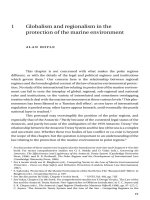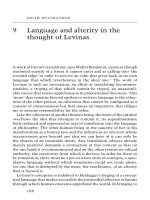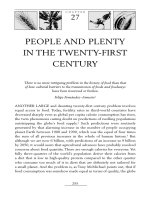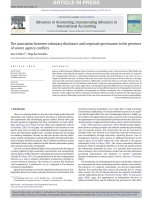Public affections and familial politics Burke, Edgeworth, and Ireland in the 1790s
Bạn đang xem bản rút gọn của tài liệu. Xem và tải ngay bản đầy đủ của tài liệu tại đây (141.04 KB, 30 trang )
Public affections and familial politics: Burke, Edgeworth,
and Ireland in the s
Just after William Fitzwilliam arrived in Dublin in January to take
up his short-lived post as Lord Lieutenant, Edmund Burke wrote a letter
to a member of the Irish Parliament in which he posed his fundamental
concern of that revolutionary decade: ‘‘My whole politicks, at present,
center in one point; and to this the merit or demerit of every measure,
(with me) is referable: that is, what will most promote or depress the
Cause of Jacobinism?’’¹ In Burke’s view, as in Fitzwilliam’s, it was the
redress of catholic grievances that would stave off revolution in Ireland:
as he wrote further on in that same letter, ‘‘I am the more serious on the
positive encouragement to be given to [catholicism], (always however as
secondary [to the Church of Ireland]) because the serious and earnest
belief and practice of it by its professors forms, as things stand, the most
effectual Barrier, if not the sole Barrier, against Jacobinism’’ (Writings
and Speeches ).
Tolerating catholicism would have strategic political advantages for
the emergent empire: as Burke had written in the Reflections on the
Revolution in France (), all right-minded Englishmen of whatever creed
would ‘‘reverently and affectionately protect all religions because they
love and venerate the great principle upon which they all agree, and the
great object to which they are all directed. They begin more and more
plainly to discern that we all have a common cause, as against a
common enemy.’’² Successfully enlisting catholic Irishmen in that
‘‘common cause’’ would require viewing their religious practice as no
disability, but as a mark of their fitness for imperial citizenship in the
struggle against France. In his holy war against Jacobinism, Burke thus
sought to redraw the lines so as to bring dissenting elements in Ireland
within the pale of English liberties from which they had been excluded.
On another front, from the ideological position most closely asso-
ciated with Burke’s radical antagonist Thomas Paine, unmet Irish
demands ranging in nature from parliamentary reform to catholic
emancipation to republican separation ultimately issued in the bloody
Rebellion of , led by the United Irishmen with the support of the
catholic Defenders. In how this alliance developed and broke down over
the course of the decade, we can also see an effort at work to construct a
counterhegemonic ‘‘common cause.’’ Crossing sectarian lines, the
United Irishmen allied themselves with France in direct opposition to
rule from Westminster, and to what Burke himself was to scorn as ‘‘the
protestant ascendancy’’: those men who profited from the official pa-
tronage wielded by the English executive at Dublin Castle and who
sought to defend their position against encroachments from parliamen-
tary reformers and radical emancipationists. However little else he
might have shared with them, Burke would no doubt have concurred
with the disaffected rebels of , whose bloody ‘‘year of liberty’’ he did
not live to witness, that it was the failure of the ascendancy to rule in any
interest other than its own that constituted the true scandal of late
eighteenth-century Ireland.
It is within the context of revolution and counterrevolution that we
can best understand Burke’s political writings on Ireland and Jacobin-
ism in the s. As Seamus Deane rightly captures Burke’s point of
view, Ireland was to him ‘‘that part of the British polity most vulnerable
to the radical ideas of the Enlightenment and revolution precisely
because it had never known under British rule the virtues of the ancient
civilization that had collapsed in France’’; Burke thus undertook a
‘‘campaign in favour of a relaxation of the penal laws with the aim of
thereby attaching Ireland more closely to England and reducing Ire-
land’s vulnerability to the French disease.’’³ It is my contention, more-
over, that Burke’s gendered vision of the patriarchal family as paradigm
for – and agent of – the orderly society undergirds the ideological work
to which Deane refers. Destroyed in France, revered in England, and
undone in Ireland by the operation of the penal laws, the patriarchal
family has a crucial role in both Burke’s anti-Jacobin arguments and his
prescriptions for ‘‘attaching’’ catholic Ireland to England.
My first aim in this chapter is to examine the place that the family
occupies in Burke’s thinking on Jacobinism and Ireland, analyzing the
gendered rhetoric of the prophylactic against rebellion which the Reflec-
tions seeks to mount. By revisiting that text, as well as Burke’s critique of
the penal laws, from a feminist point of view, I aim to demonstrate that a
gendered conception of the patriarchal family, and of women’s and
men’s roles within it, lies at the heart of Burke’s project for remaking
Ireland in an English mold.
Allegories of Union in Irish and English writing
Burke’s quarrel with the French Jacobins in the Reflections arises from
their repudiation of the traditional sociopolitical order, their challenge
to the venerable institutions that had provided a fiction of continuity
over time and an ideological bulwark against change. Early Jacobin
sympathizers in England, the immediate targets of Burke’s counterat-
tack, sought to draw inspiration from events in France for political and
social movements at home, and particularly for dissenters’ efforts to
achieve the measure of equality that had been denied them. But Burke
casts their egalitarian rhetoric in nationalist and protectionist terms, as
an illegal and unnatural transfer of goods: ‘‘We ought not, on either side
of the water, to suffer ourselves to be imposed upon by the counterfeit
wares which some persons, by a double fraud, export to you in illicit
bottoms as raw commodities of British growth, though wholly alien to
our soil, in order afterwards to smuggle them back again into this
country, manufactured after the newest Paris fashion of an improved
liberty’’ (Reflections –). For Burke, Jacobin principles are not ‘‘raw
commodities of British growth,’’ but alien goods, ‘‘counterfeit wares.’’
Having declared French imports injurious to true British interests, he
sets out to demonstrate that the established principles of government
and society are indigenous historical products of British national life; in
so doing, he sets in motion the flow of associations between domestic
and political forms of order that runs throughout the Reflections.
Burke borrows his primary metaphors for political society from the
aristocratic idiom of the landed estate and patrilineal succession, which
naturalizes the link between property and paternity. Over the course of
the Reflections, natural order is represented as familial just as the family
comes to appear naturally ordained. The interweaving of one symbolic
reference with others makes it nearly impossible to separate distinct
strands, and this is precisely Burke’s rhetorical aim: as Ronald Paulson
traces the progression, in ‘‘[moving] from the organic growth of the
plant (the great British oak) to the countryside, the country house and
the georgic ideal of retirement, the estate, the aristocratic family and its
generations, the inviolability of inheritance,’’ Burke naturalizes the
social order.⁴ In this way, Burke justifies existing arrangements – for the
transmission of property as well as for the continuance of the extant
form of government – by a single principle, as what he calls ‘‘an entailed
inheritance’’ (). All Englishmen, dead or alive or yet to be born, have an
equal claim to it: ‘‘The very idea of the fabrication of a new government
is enough to fill us with disgust and horror. We wished at the period of
Burke, Edgeworth, and Ireland in the s
the [] Revolution, and do now wish, to derive all we possess as an
inheritance from our forefathers. Upon that body and stock of inheritance we
have taken care not to inoculate any cyon alien to the nature of the
original plant’’ (–). Against innovation, revolution, and the hybrid-
ity they breed, Burke proposes patrilineal inheritance as the only natural
and just means of insuring economic and political continuity and repro-
ducing it over time. As J. G. A. Pocock argues, in ‘‘[making] the state not
only a family but a trust . . . an undying persona ficta, which secures our
liberties by vesting the possession of them in an immortal continuity’’
and so ‘‘identifying the principles of political liberty with the principles
of our law of landed property,’’ Burke represents the nexus among
family, property, and civil society as immemorial and indissoluble.⁵
Burke’s concern here is to furnish ‘‘a sure principle of conservation
and a sure principle of transmission, without at all excluding a principle
of improvement’’ (); while he does not rule out political change and
economic expansion, the two watchwords of the rising bourgeoisie with
which he is in some respects allied, Burke yet hopes to control the
momentum of both by restraining them within the firmly established
bounds of what he calls a ‘‘family settlement’’ (). He draws most
explicitly on the affective relations of the familial realm for his model of
how to contain the anarchic energies he associates with both the
revolutionary French and the rising bourgeois English, ‘‘the men of
ability’’: ‘‘we have given to our frame of polity the image of a relation in
blood, binding up the constitution of our country with our dearest
domestic ties, adopting our fundamental laws into the bosom of our
family affections, keeping inseparable and cherishing with the warmth
of all their combined and mutually reflected charities our state, our
hearths, our sepulchres, and our altars’’ (). Within this framework, to
rise against the polity would be equivalent to parricide; far better, then,
to treat both head of family and head of state with a respectful affection
that proceeds from one and the same source. Burke’s naturalization of
ties to patriarch and monarch, as Steven Blakemore establishes, is
invested with the power of ‘‘family affections’’ and makes any assault on
those ties appear to be an unnatural, alien, un-English act.⁶
Particularly in its emphasis on the affective charge that should inform
a citizen’s response to home as well as state, Burke’s intertwining of
familial with political relations in reconfiguring English patriarchy can
be read from a feminist perspective as part of a wider cultural reimagin-
ing of relations among men and women in this period. As Leonore
Davidoff and Catherine Hall argue, a characteristically middle-class
Allegories of Union in Irish and English writing
ethos came to depend on an articulation of gender and class that
redefined the family as an autonomous political, economic, and psycho-
logical unit: ‘‘forms of property organization . . . framed gender rela-
tions through marriage, the division of labour and inheritance practi-
ces’’; moreover, in their reading, ‘‘the structure of property can be
regarded as a powerful ‘relational idiom’ in the creation of both gender
and class, placing men as those with power and agency, women as
passive dependants.’’⁷ Whereas some historians, following Lawrence
Stone, have argued for an historical shift in the function of the family
from economic to affective group, Davidoff and Hall illuminate the
interrelation of the affective with the economic, pointing out the ways in
which bourgeois families consolidated their socioeconomic power
through a redefinition of gender roles and practices. Providing a critical
tool for reevaluating concepts of property and inheritance, this lens
brings into view their gendered elements.
For example, in Burke’s case, we see that the idea of inheritance
entails both economic and political transmission, operations that osten-
sibly involve and concern only men; materialist feminist analysis enables
us to recognize, however, that the ‘‘relational idiom’’ functions both as a
norm for the lived experience of men and women and, in the ideological
register, as a powerful warrant for the gendered character of that
experience. Gary Kelly explains that ‘‘since women in both upper and
middle classes continued to serve the economic function of transferring
property from one man to another,’’ women were also charged with
‘‘restraint of the erotic ‘passions’ ensuring the stability and integrity of
the family as a property trust continuing through the generations.’’⁸
Thus while women are not considered as political actors – excluded
from Burke’s ‘‘we,’’ and by no means included among ‘‘our forefathers’’ –
they are profoundly implicated in the familial paradigm he employs,
both as the locus for ‘‘family affections’’ and as the embodied and
embodying agents of inheritance. Even so, women’s crucial role in the
metaphorical and literal reproduction of the family is largely written out
of Burke’s account of transmission and inheritance, and that absence
should alert us to the gender politics of Burkean thought.⁹ For while
Burke presents the family as a neutral figure embracing all within its
grasp, his historicist defense of English liberty rests on some latent
assumptions about the nature and character of women and men, con-
ceived ahistorically as fixed and unchanging – yet also liable to extreme
unsettling in the revolutionary context.
These assumptions have been well documented in the work of both
Burke, Edgeworth, and Ireland in the s
Blakemore and Paulson, who agree on the centrality of the gender
binary to Burke’s politics as well as, in Isaac Kramnick’s psychobiog-
raphical terms, to his own personality.¹⁰ In its basic form, Burke’s binary
opposes masculine activity to feminine passivity in much the same way
that Davidoff and Hall characterize emergent middle-class gender
ideology. From his earliest published work, APhilosophical Enquiry into the
Origin of our Ideas of the Sublime and the Beautiful (), Burke associated
masculinity with energy and terror, femininity with quiescence and a
pleasing delight.¹¹ And he rhetorically registered his outrage at the
French Revolution in terms drawn from an available vocabulary of
gender/class polarity, particularly visible in the celebrated section of the
Reflections concerning the French royal family. But helpful as Blakemore
and Paulson are in identifying the conventional class and gender associ-
ations of Burke’s rhetoric, they do not employ gender as an analytic
category in their readings; by contrast, my concern is not so much with
how femininity figures in the Reflections, but in what ways and for what
purposes it is written out, or written in, as a force in maintaining or
disturbing the Burkean status quo. Burke’s gender politics are
predicated on effacing the relation of women to property and, more
generally, to the public sphere: indeed, as the political theorist Linda
M. G. Zerilli effectively argues, ‘‘what comes apart in the French
Revolution . . . is a gendered semiotic code,’’ in a collapse of the
stabilizing gender/class boundaries on which so much of Burkean
thought depends.¹²
Patrilineal inheritance, as I have noted, is central to Burke’s thinking
about the reproduction of political and economic forms; he represents it
as sure and certain, while revolutionary change is dangerous and un-
predictable in its outcomes. Yet inheritance can never be as sure as
patriarchal thinkers (or putative fathers) would like insofar as its proper
functioning may be subverted by the difficulties of determining pater-
nity or the misrepresentations of impending maternity.¹³ Burke’s confi-
dence in the security of hereditary transmission depends, in other words,
on the tacit assumption of marital chastity among women, who act as
the unacknowledged ground for and guarantors of familial, economic,
and political legitimacy. In this light, his concern about the illegitimacy
of ‘‘counterfeit wares’’ and alien cyons betrays a specifically gendered,
culturally pervasive anxiety: that no principle of transmission can be
fully secure if feminine fidelity is not maintained.
Not surprisingly, then, Burke figures the worst excesses of the revol-
utionaries as a threat of uncontained female sexuality that could destroy
Allegories of Union in Irish and English writing
all traditional ties. This threat can only be rebuffed by the renewal of
those ‘‘two principles’’ that have inspired ‘‘all the good things which are
connected with manners and with civilization’’: ‘‘the spirit of a gentle-
man and the spirit of religion’’ (). Burke connects the laxity of French
morals with the overthrow of paternal right:
All other people have laid the foundations of civil freedom in severer manners
and a system of a more austere and masculine morality. France, when she let
loose the reins of regal authority, doubled the license of a ferocious dissoluteness
in manners . . . and has extended through all ranks of life, as if she were
communicating some privilege or laying open some secluded benefit, all the
unhappy corruptions that usually were the disease of wealth and power. ()
As the ‘‘austere and masculine’’ give way to ‘‘a ferocious dissoluteness,’’
the ‘‘disease’’ of aristocratic manners – often associated in Burke, as in
the work of Mary Wollstonecraft, with sexual license – spreads through-
out the body politic, infecting all ranks; if not explicitly labeled as such,
the effeminate or feminine character of the carriers of this plague is yet
suggested. Throughout the Reflections, Tom Furniss argues, French-
women are thus ‘‘depicted as having abandoned their femininity and
modesty . . . such violations of ‘proper’ gender roles and behavioural
patterns are both endemic to and emblematic of a general breakdown of
political order.’’¹⁴
Even more overtly, in a later work, Letter to a Noble Lord (), Burke
specifies the threat he perceives in sexual terms, drawing on misogynous
Miltonic and Virgilian representations to represent female license:
The revolution harpies of France, sprung from night and hell, or from that
chaotick anarchy, which generates equivocally ‘‘all monstrous, all prodigious
things,’’ cuckoo-like, adulterously lay their eggs, and brood over, and hatch
them in the nest of every neighbouring State. These obscene harpies, who deck
themselves, in I know not what divine attributes, but who in reality are foul and
ravenous birds of prey (both mothers and daughters) flutter over our heads, and
souse down upon our tables, and leave nothing unrent, unrifled, unravaged, or
unpolluted with the slime of their filthy offal.¹⁵ (Writings and Speeches )
Unchecked by a manly morality, this monstrous feminine principle
commits all manner of outrage, from shitting on the innocent to laying
eggs in others’ nests, and so undermines the security of hereditary
transmission; ‘‘reproduction outside marriage destroys property and all
other forms of masculinist self-representation,’’ as Zerilli comments, ‘‘by
destroying the legal fiction of paternity,’’ or at least by exposing it as a
fiction.¹⁶ Burke’s images thus portray the pollution and desecration
incumbent on feminine freedom as an affront to civilized domestic life –
Burke, Edgeworth, and Ireland in the s
so central to the literal and symbolic reproduction of masculine hegem-
ony – while simultaneously representing feminine promiscuity as a
threat to sociopolitical order.
Burke’s insistence on the importance of the family, then, has a double
valence: it is necessary, along with the state, for the restraint of mascu-
line energy and desire; and it also provides a brake on feminine sexual
appetites – prone, if unchecked, to adulterous and therefore revolution-
ary excess. From this perspective, the celebrated passage in the Reflections
concerning Marie Antoinette reads not as an anachronistic defense of
chivalry, but as a very contemporary plea for a requisite discipline in
sexual and familial relations, conceived as central to the maintenance of
order. For part of what Burke fears in the Jacobin revolt is the unfixing
of the proper bounds of feminine and masculine sexual restraint just at
the moment when those bounds are more crucial than ever:
Never, never more shall we behold that generous loyalty to rank and sex, that
proud submission, that dignified obedience, that subordination of the heart
which kept alive, even in servitude itself, the spirit of an exalted freedom. The
unbought grace of life, the cheap defense of nations, the nurse of manly
sentiment and heroic enterprise, is gone! It is gone, that sensibility of principle,
that chastity of honor which felt a stain like a wound, which inspired courage
whilst it mitigated ferocity, which ennobled whatever it touched, and under
which vice itself lost half its evil by losing all its grossness. (–)
If ‘‘that generous loyalty to rank and sex’’ – ‘‘the unbought grace of life,
the cheap defense of nations, the nurse of manly sentiment and heroic
enterprise’’ – should disappear in England as it has in France, all
distinctions would thereby be lost. Here Burke avows the central role of
masculine heterosexual discipline in creating and maintaining social,
political, and national order: without ‘‘that subordination of the heart’’
and ‘‘that chastity of honor’’ – without, that is, an ideological apparatus
for carefully controlling and sublimating men’s sexual energy – social
life threatens to devolve into an uncivilized chaos of anarchic forces and
desires. And if the feminine proprieties – ‘‘the pleasing illusions,’’ ‘‘the
sentiments which beautify and soften private society,’’ ‘‘all the decent
drapery of life’’ () – that should restrain masculine energy were to be
cast aside, either by men or by women themselves, then the result in
Burke’s estimation would be the destruction of civil society.
Thus Burke’s emphasis on securing a ‘‘family settlement’’ of property
and government also involves settling the affective and libidinal forces at
work among women and men in and on particular individuals, be they
husbands, wives, or children. Centering his affections on his family, a
Allegories of Union in Irish and English writing
father–husband simultaneously finds an appropriate channel for desire
and supports the necessarily hierarchical and fixed system of benefits
and privileges that structure the social order; just as ‘‘no Prince appears
settled unless he puts himself into the situation of the Father of a
Family,’’ as Burke wrote during the Regency crisis, no lesser man can be
truly loyal to his sovereign unless he acquires the same curb on his
appetites.¹⁷ A proper mother–wife, who lays no eggs in any nest but her
own, similarly requires near kin to accommodate her libidinal invest-
ments; thus she will come to represent in her own person ‘‘the pleasing
illusions,’’ the principle of womanhood worthy of a glorious respect,
while insuring the reproduction of familial life at a number of different
levels. The ideal Burkean family, in short, stands as the embodiment of
‘‘public affections,’’ which ‘‘create in us love, veneration, admiration, or
attachment,’’ ‘‘required sometimes as supplements, sometimes as cor-
rectives, always as aids to law’’ (Reflections ): and while ‘‘the law is
male,’’ as Terry Eagleton aptly remarks, ‘‘hegemony is a woman.’’¹⁸ On
the sanctity of this private entity rests public, national, and imperial
security.
The prophylactic rhetoric of the Reflections therefore depends on
representing the best means of English resistance to the French disease
as the patriarchal, property-bearing family, construed as the natural and
proper school for attaching individuals first to their own ‘‘little platoon’’
(), and second to the broader family of the state. In this light, Jacobin-
ism can best be understood as the principle of opposition to that order
which undoes the hierarchical, unfixes the passions, and unsettles the
family and the nation – ‘‘the dissolution of civil society as such,’’ in
Eagleton’s words, ‘‘and thus a subversion of the very notion of govern-
ment through the affections.’’¹⁹ What France threatens to become in its
breaking of the patriarchal compact, Burke is determined England shall
never be: but closer to home, the sister kingdom presents an even more
striking model for how the subversion of order that Burke associates in
the Reflections with English radicalism and French Jacobinism has al-
ready produced chronic disaffection in Ireland.
In his late apologia, Letter to a Noble Lord, Burke portrays his duties to
Ireland and England as different in degree, but not in kind. With regard
to Ireland, he writes that ‘‘my endeavour was to obtain liberty for the
municipal country in which I was born, and for all descriptions and
denominations in it.’’ But Britain had a larger claim: ‘‘Mine was to
support with unrelaxing vigilance every right, every privilege, every
Burke, Edgeworth, and Ireland in the s
franchise, in this my adopted, my dearer and more comprehensive
country’’ (Writings and Speeches ). His stance here as elsewhere demon-
strates what Thomas H. D. Mahoney has called Burke’s ‘‘imperial
mentality,’’ whereby the interests of Ireland, however significant in their
own right, were all the more important insofar as they accorded with –
or deviated from – those of the ‘‘more comprehensive country’’ of Great
Britain.²⁰
An active, multifaceted Irish opposition was, however, articulating
those differences of interest with increasing volubility in Burke’s time.
The elements in Ireland contending for political control in the latter half
of the eighteenth century included those at Dublin Castle who distrib-
uted patronage and ‘‘managed’’ the Irish parliament; after , those
Irish parliamentarians anxious to wrest a broader measure of autonomy
from England; an emergent urban catholic bourgeoisie centered in
Dublin who sought full access to the political process; and the presby-
terian dissenters of Ulster who suffered under disabilities of their own.
Spurred on by the example of the North American colonists, patriot
groups within Ireland such as the Volunteers, originally formed as a
militia group in , protested both excessive taxation and unequal
representation. And the parliamentary agitation that issued in the
repeal of Poynings’ Act in gave the Irish parliament greater
freedom to legislate for Ireland, but without essentially altering the fact
of direct British rule in the form of the Dublin Castle executive.
If landed protestants in parliament had their grievances against the
imperial power, so, too, did these less powerful constituencies: prosper-
ous middle-class dissenters and Dublin catholics formed extra-parlia-
mentary associations such as the United Irishmen and the Catholic
Committee to push, respectively, for parliamentary reform and catholic
emancipation. Most seriously, prospects for an alliance between these
groups, each excluded from full citizenship, alarmed both the landed
protestant minority in Ireland and the British government in the s,
especially in view of the threat from France. And each dominant force
moved in its own way – and in its own interests – to stem the tide, the
ascendancy by calling for repression and the government by granting
concessions to catholics, albeit incomplete and grudging, in the relief
bills of and .²¹
Even as Irish opposition to English rule grew in some quarters, Burke
maintained the position on the proper relation between his two coun-
tries that he had articulated as early as , in his ‘‘Letter to Sir Charles
Bingham’’:
Allegories of Union in Irish and English writing
. . . if it be true, that the several bodies, which make up this complicated mass,
are to be preserved as one Empire, an authority sufficient to preserve that unity,
and by its equal weight and pressure to consolidate the various parts that
compose it, must reside somewhere: that somewhere can only be in England
. . . So that I look upon the residence of the supreme power to be settled here;
not by force, or tyranny, or even by mere long usage, but by the very nature of
things, and the joint consent of the whole body. (Writings and Speeches )
From an imperial point of view, Burke could imagine only one possible
effective center for power and ultimate authority: in the empire, as in the
patriarchal family, one head alone could prevail, ‘‘by the very nature of
things,’’ yet its rule must be such that it could secure ‘‘the joint consent’’
of the governed. Burke’s imperial mentality, that is, was predicated on
the same hierarchical gendered thinking that structured his approach to
other forms of governance, be they national or familial.
Within this version of the imperial family of Great Britain, Ireland
figures as a subordinate – perhaps a son or a sister, but more typically a
daughter or a wife – whose dependence would be tempered by its
treatment at the hands of a just, manly, but not tyrannical father/
husband/brother. As part of that family, Ireland was entitled to a
limited autonomy, but subject ultimately to its superior’s sovereignty,
both for its own benefit and Great Britain’s: as Burke wrote in ‘‘A Letter
on the Affairs of Ireland’’ (), his last extant work, ‘‘the closest
connexion between Great Britain and Ireland, is essential to the well
being, I had almost said, to the very being, of the two Kingdoms . . .
Ireland, locally, civilly, and commercially independent, ought politically
to look up to Great Britain in all matters of peace and of War’’ (Writings
and Speeches ). A vital factor in the empire, Anglo-Ireland was said to
control its own sphere of affairs, yet had of necessity to bow to the
dominating patriarch who sanctioned and circumscribed that control in
its own imperial interests.
But Burke’s comments to Bingham also register the significant bar-
riers to Irish recognition of English supremacy, for from the point of
view of more than one dissenting Irish interest in the s and s,
English sovereignty over Ireland was read precisely as a matter of
‘‘force, or tyranny’’; nor could ‘‘long usage,’’ by which he refers to the
doctrine of prescription, really be said to apply to a country in which
conquest had to be perennially renewed, a point that Burke himself
would make at critical moments in the s. Within Ireland, multiple
constituencies pursued their often conflicting agenda; indeed, the histor-
ians Thomas Bartlett and Kevin Whelan have each argued that this was
Burke, Edgeworth, and Ireland in the s
exactly the way Pitt’s government wanted it, in effect playing off one
interest against another so as to keep all elements in a perpetual state of
internecine crisis.²² Securing ‘‘the joint consent of the whole body,’’
divided as it was by class, creed, and national identifications, could
never have been an easy task, even under the best of conditions. But by
focusing specifically on the particular impediments to catholic citizen-
ship, as did the British government from the s, Burke attempts to
demonstrate that the use of force and tyranny against catholic Ireland,
far from securing anything like ‘‘joint consent,’’ had produced instead
ongoing disaffection.
Penal laws passed during the reigns of William and Anne, ostensibly to
prevent the spread of catholicism, not only entailed restrictions on
religious training and worship, but also, and no doubt more importantly
in Burke’s eyes, constrained economic opportunities and property-
owning for members of the faith: ‘‘though garbed as a holy war against
popery,’’ as Theodore W. Allen puts it, ‘‘this policy was governed
mainly by considerations of capital accumulation.’’²³ Debarred from the
franchise, magistracies, army and navy commissions, some branches of
the legal profession, the university, and most other forms of education
and advancement at home and abroad, catholic men were thus essen-
tially excluded from all the institutions that helped to produce and shape
the masculinist ideal of the landed gentleman, even if the laws were
unevenly enforced and, significantly, ‘‘in no way hindered the steady
growth of a middle-class mercantile elite.’’²⁴ Many of the laws were
repealed during Burke’s lifetime: in , catholics were enabled to
inherit and sell land on the same basis as protestants; by , catholic
men could be called to the bar as barristers and solicitors, were permit-
ted to intermarry with members of other faiths, and granted the right to
education; in , the franchise was given to forty-shilling freeholders,
and catholic men were admitted to army and navy commissions and to
university. They were still, however, excluded from parliament and
from certain high offices within the government, with the great mass of
catholics of course remaining entirely unenfranchised. Burke’s opposi-
tion to this restrictive legislation, however, which took written form as
early as in his unfinished ‘‘Tracts relating to the Popery Laws,’’
centers not on its inherent injustice to an oppressed class, but on his
sense that Ireland could not be reformed or conciliated unless English
practices of familial inheritance and domestic affection, so crucial to his
Allegories of Union in Irish and English writing









